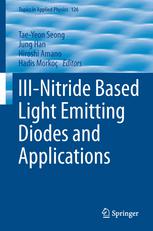

Most ebook files are in PDF format, so you can easily read them using various software such as Foxit Reader or directly on the Google Chrome browser.
Some ebook files are released by publishers in other formats such as .awz, .mobi, .epub, .fb2, etc. You may need to install specific software to read these formats on mobile/PC, such as Calibre.
Please read the tutorial at this link: https://ebookbell.com/faq
We offer FREE conversion to the popular formats you request; however, this may take some time. Therefore, right after payment, please email us, and we will try to provide the service as quickly as possible.
For some exceptional file formats or broken links (if any), please refrain from opening any disputes. Instead, email us first, and we will try to assist within a maximum of 6 hours.
EbookBell Team

4.4
82 reviewsLight emitting diodes (LEDs) are already used in traffic signals, signage lighting, and automotive applications. However, its ultimate goal is to replace traditional illumination through LED lamps since LED lighting significantly reduces energy consumption and cuts down on carbon-dioxide emission. Despite dramatic advances in LED technologies (e.g., growth, doping and processing technologies), however, there remain critical issues for further improvements yet to be achieved for the realization of solid-state lighting. This book aims to provide the readers with some contemporary LED issues, which have not been comprehensively discussed in the published books and, on which the performance of LEDs is seriously dependent. For example, most importantly, there must be a breakthrough in the growth of high-quality nitride semiconductor epitaxial layers with a low density of dislocations, in particular, in the growth of Al-rich and and In-rich GaN-based semiconductors. The materials quality is directly dependent on the substrates used, such as sapphire, Si, etc. In addition, efficiency droop, growth on different orientations and polarization are also important. Chip processing and packaging technologies are key issues. This book presents a comprehensive review of contemporary LED issues. Given the interest and importance of future research in nitride semiconducting materials and solid state lighting applications, the contents are very timely. The book is composed of chapters written by leading researchers in III-nitride semiconducting materials and device technology. This book will be of interest to scientists and engineers working on LEDs for lighting applications. Postgraduate researchers working on LEDs will also benefit from the issues this book provides.